BBC听力Welcome to the MAKING OF A NATION
- 格式:doc
- 大小:28.00 KB
- 文档页数:9
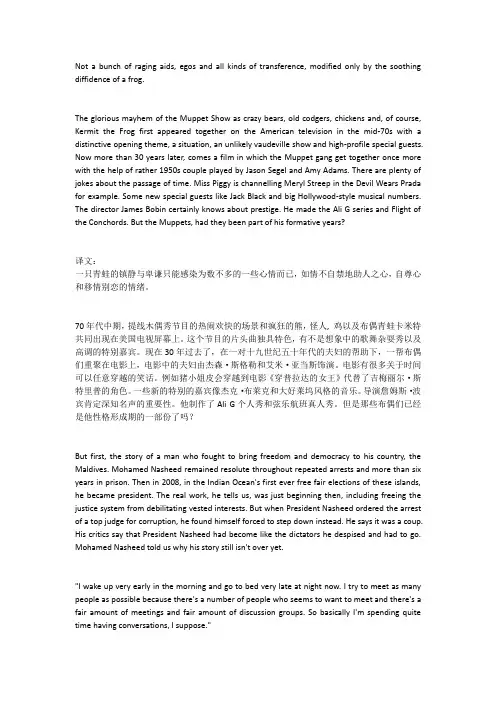
Not a bunch of raging aids, egos and all kinds of transference, modified only by the soothing diffidence of a frog.The glorious mayhem of the Muppet Show as crazy bears, old codgers, chickens and, of course, Kermit the Frog first appeared together on the American television in the mid-70s with a distinctive opening theme, a situation, an unlikely vaudeville show and high-profile special guests. Now more than 30 years later, comes a film in which the Muppet gang get together once more with the help of rather 1950s couple played by Jason Segel and Amy Adams. There are plenty of jokes about the passage of time. Miss Piggy is channelling Meryl Streep in the Devil Wears Prada for example. Some new special guests like Jack Black and big Hollywood-style musical numbers. The director James Bobin certainly knows about prestige. He made the Ali G series and Flight of the Conchords. But the Muppets, had they been part of his formative years?译文:一只青蛙的镇静与卑谦只能感染为数不多的一些心情而已,如情不自禁地助人之心,自尊心和移情别恋的情绪。
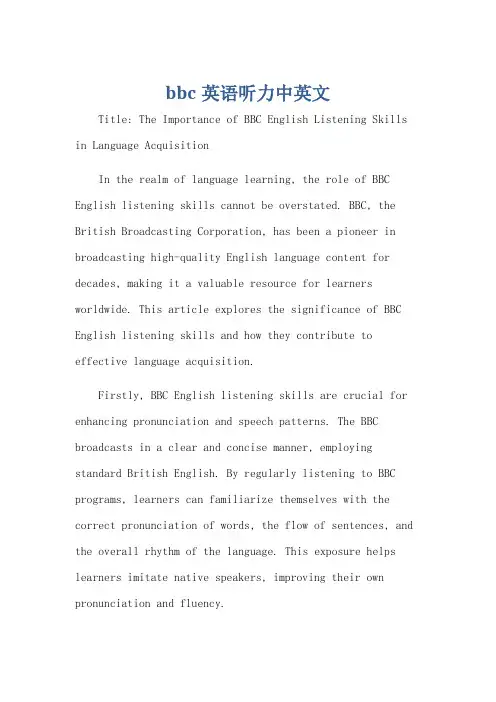
bbc英语听力中英文Title: The Importance of BBC English Listening Skills in Language AcquisitionIn the realm of language learning, the role of BBC English listening skills cannot be overstated. BBC, the British Broadcasting Corporation, has been a pioneer in broadcasting high-quality English language content for decades, making it a valuable resource for learners worldwide. This article explores the significance of BBC English listening skills and how they contribute to effective language acquisition.Firstly, BBC English listening skills are crucial for enhancing pronunciation and speech patterns. The BBC broadcasts in a clear and concise manner, employing standard British English. By regularly listening to BBC programs, learners can familiarize themselves with the correct pronunciation of words, the flow of sentences, and the overall rhythm of the language. This exposure helps learners imitate native speakers, improving their own pronunciation and fluency.Moreover, BBC English listening skills aid invocabulary expansion. The BBC covers a wide range of topics, including news, culture, science, and entertainment. This diversity ensures that learners are exposed to a vast array of vocabulary and expressions. Through regular listening, learners can absorb new words and phrases, expanding their language repertoire. This, in turn, enhances their abilityto communicate effectively in English.Furthermore, BBC English listening skills promote comprehension skills. The BBC employs complex sentences and a wide range of grammatical structures in its broadcasts.By listening to these programs, learners are challenged to understand and interpret the meaning of the content. This practice improves their ability to process and analyze language, enhancing their comprehension skills. Over time, this skillset allows learners to understand more complex texts and conversations with ease.Additionally, BBC English listening skills contributeto cultural understanding. The BBC often incorporates cultural references and insights into its programs,providing learners with a window into British culture andsociety. By listening to these programs, learners can gain a deeper understanding of British values, traditions, and ways of life. This cultural awareness not only enhances their language skills but also broadens their perspective, making them more informed and tolerant of diverse cultures. Moreover, BBC English listening skills are beneficial for learners preparing for English language exams. Many exams, such as IELTS and TOEFL, include listening comprehension sections that test the ability to understand spoken English. By practicing with BBC programs, learners can familiarize themselves with the format and style of these exams, improving their chances of success.Finally, BBC English listening skills foster a love for the language. The engaging and informative content of BBC programs often captures the imagination of learners, making learning English a pleasure rather than a chore. This enthusiasm and motivation can be a powerful driving force for continued language acquisition.In conclusion, BBC English listening skills play a pivotal role in language acquisition. They enhance pronunciation, expand vocabulary, improve comprehensionskills, promote cultural understanding, aid in exam preparation, and foster a love for the language. Therefore, it is highly recommended that learners incorporate BBC English listening into their language learning routine to maximize their progress and enjoyment in the journey of acquiring English.。
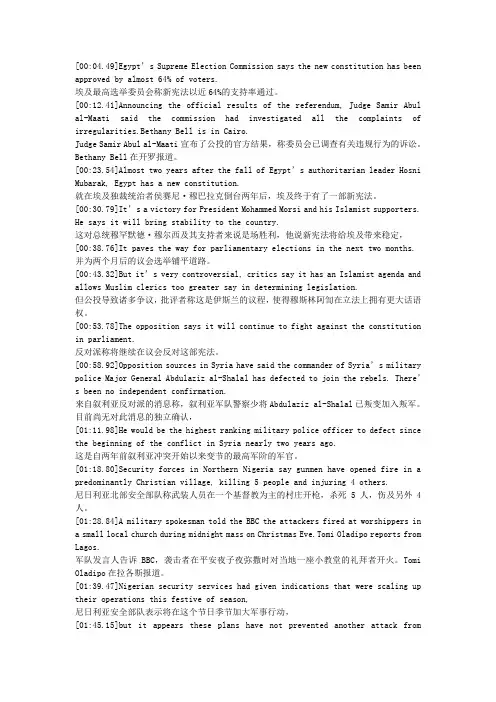
[00:04.49]Egypt’s Supreme Election Commission says the new constitution has been approved by almost 64% of voters.埃及最高选举委员会称新宪法以近64%的支持率通过。
[00:12.41]Announcing the official results of the referendum, Judge Samir Abul al-Maati said the commission had investigated all the complaints of irregularities.Bethany Bell is in Cairo.Judge Samir Abul al-Maati宣布了公投的官方结果,称委员会已调查有关违规行为的诉讼。
Bethany Bell在开罗报道。
[00:23.54]Almost two years after the fall of Egypt’s authoritarian leader Hosni Mubarak, Egypt has a new constitution.就在埃及独裁统治者侯赛尼·穆巴拉克倒台两年后,埃及终于有了一部新宪法。
[00:30.79]It’s a victory for President Mohammed Morsi and his Islamist supporters. He says it will bring stability to the country.这对总统穆罕默德·穆尔西及其支持者来说是场胜利,他说新宪法将给埃及带来稳定,[00:38.76]It paves the way for parliamentary elections in the next two months. 并为两个月后的议会选举铺平道路。
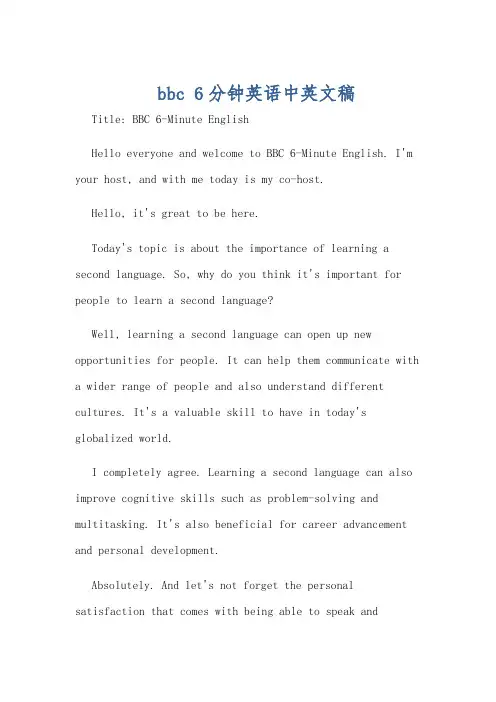
bbc 6分钟英语中英文稿Title: BBC 6-Minute EnglishHello everyone and welcome to BBC 6-Minute English. I'm your host, and with me today is my co-host.Hello, it's great to be here.Today's topic is about the importance of learning a second language. So, why do you think it's important for people to learn a second language?Well, learning a second language can open up new opportunities for people. It can help them communicate with a wider range of people and also understand different cultures. It's a valuable skill to have in today's globalized world.I completely agree. Learning a second language can also improve cognitive skills such as problem-solving and multitasking. It's also beneficial for career advancement and personal development.Absolutely. And let's not forget the personal satisfaction that comes with being able to speak andunderstand a second language. It's a great feeling to be able to connect with people from different backgrounds.Now, let's switch to Chinese.大家好,欢迎收听BBC 6分钟英语。
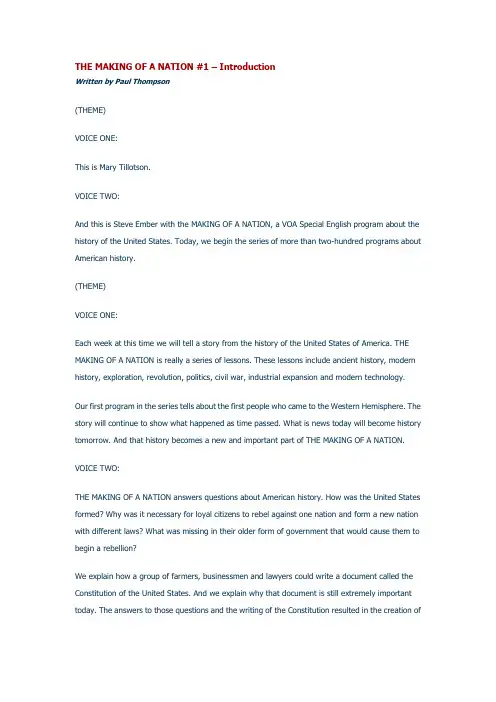
THE MAKING OF A NATION #1 – IntroductionWritten by Paul Thompson(THEME)VOICE ONE:This is Mary Tillotson.VOICE TWO:And this is Steve Ember with the MAKING OF A NATION, a VOA Special English program about the history of the United States. Today, we begin the series of more than two-hundred programs about American history.(THEME)VOICE ONE:Each week at this time we will tell a story from the history of the United States of America. THE MAKING OF A NATION is really a series of lessons. These lessons include ancient history, modern history, exploration, revolution, politics, civil war, industrial expansion and modern technology.Our first program in the series tells about the first people who came to the Western Hemisphere. The story will continue to show what happened as time passed. What is news today will become history tomorrow. And that history becomes a new and important part of THE MAKING OF A NATION.VOICE TWO:THE MAKING OF A NATION answers questions about American history. How was the United States formed? Why was it necessary for loyal citizens to rebel against one nation and form a new nation with different laws? What was missing in their older form of government that would cause them to begin a rebellion?We explain how a group of farmers, businessmen and lawyers could write a document called the Constitution of the United States. And we explain why that document is still extremely important today. The answers to those questions and the writing of the Constitution resulted in the creation ofthe United States of America. The Constitution of the United States has been used by more than one government as a guide to creating a modern democracy.VOICE ONE:In other programs, we explain why it was necessary for those who formed the United States to include laws that guarantee freedom of speech and freedom of religion. We tell why they thought it was important to guarantee every citizen the right to write, print and publish material on any subject. And we explain why they felt there was a need to include a law that guaranteed a person the right to a fair and public trial if that person was charged with a crime.VOICE TWO:The American Revolution was fought for several reasons. One of the most important was the idea that citizens of a country should have a voice in its decisions. The men who led the revolt against Britain wanted to be able to vote. They agreed that a citizen should have a voice in the government that ruled his country. British citizens in the American colonies paid taxes but had no representative in the British Parliament. This lack of representation caused a growing anger in the American colonies.When the men who led the revolt against Britain formed a new government they made sure that all free men who owned land and paid taxes were permitted to vote. More importantly they decided that any free citizen could be a candidate for public office.Our series of programs explains this idea. These programs describe the elections of each American president. We tell why some candidates were successful and why others failed.We also tell about mistakes that were made when the United States was created. The greatest mistake was slavery. We tell about slavery and the pain and suffering it caused for all those involved. We tell of the great Civil War that was fought to keep the United States united and to end slavery.We also tell how election laws were changed to permit any citizen over the age of eighteen to vote in local and national elections.VOICE ONE:Many of our programs tell about the ideas and issues that had a great effect on the United States. But most importantly, we tell about the people who worked with these ideas and issues to make the United States a successful nation.We tell about George Washington. He began life as a farmer. He became a military commander and the first president of the United States. He became a soldier because his country needed him. He became president because the citizens of the new country wanted him as their leader. When his time as president was over, George Washington gave up power and once again became a farmer and a private citizen.Graphic ImageWe tell about Thomas Jefferson. He wrote the beautiful words of the Declaration of Independence. That document told the world that the people in this new country would no longer answer to a European ruler.VOICE TWO:Some of the men who formed the United States into a nation during the seventeen-hundreds were well educated and wealthy. Abraham Lincoln was not. He was proof that in a nation of equal laws, a poor man could rise to become the president of the United States.Abraham Lincoln became president during the eighteen-sixties when several southern states decided they no longer wanted to be part of the United States. We tell how President Lincoln dealt with the terrible Civil War that almost split the country apart.VOICE ONE:One of our programs deals with a speech that President Lincoln gave in the little town of Gettysburg, Pennsylvania. A great battle had been fought there. President Lincoln had been asked to come to Gettysburg to say a few words at the dedication of a military burial place.What he said that day became one of the most famous speeches in the English language. President Lincoln's speech honored the young men who had died on that bloody battlefield. He also told the world why the terrible war was being fought and why it was so important.Listen to the first sentence of his famous speech. In only a few words, President Lincoln explained the idea that was, and is still, so important to each citizen of the United States.VOICE THREE:"Four Score and seven years ago, our fathers brought forth on this continent a new nation, conceived in liberty, and dedicated to the proposition that all men are created equal."You can hear all of President Lincoln's famous words in our program about his speech at Gettysburg. We tell how he wrote the speech. And we tell about the sadness he felt because he believed his few words had been a failure. The story of the famous Gettysburg Address is only one of several programs that tell the story of Abraham Lincoln.VOICE TWO:THE MAKING OF A NATION includes programs about many different subjects. We tell about culture. We tell about social changes. For example, we tell about a time called the Roaring Twenties. They were the years from nineteen-twenty to nineteen-twenty nine.It was a time when young men and women began to change some of the traditions of their parents and grandparents. The Roaring Twenties were years of revolution in social values among some Americans.Movies were new and exciting. Music was changing. And newspapers were printing as many as five editions a day to present the latest news. By the end of the Roaring Twenties, radios could be found in most American homes. And a young pilot named Charles Lindbergh flew a small plane from the United States to an airport near Paris, France. He became a world hero for flying alone across the Atlantic Ocean.VOICE ONE:The Roaring Twenties ended with a crash. That crash was the beginning of the worst economic crisis in American history. The economic crisis was called the Great Depression. The MAKING OF A NATION explains what caused this depression. We tell how millions of Americans were without work. We tell the sad story of people who lost their jobs, their homes and their hope for the future. We tell how this great economic failure affected Americans and the rest of the world.VOICE TWO:We also tell about the administration of President Franklin Roosevelt. He was elected to office with a promise that he would bring the United States out of the Great Depression. Franklin Roosevelt served longer than any other president in American history.We tell about the elections and administrations of the presidents elected since that time. We tell about World War One, World War Two and other wars. And we tell about the social, cultural and historic events that were important to the growth of the United States as a nation.(THEME)VOICE ONE:This VOA Special English program THE MAKING OF A NATION was written and produced by Paul Thompson. This is Mary Tillotson.VOICE TWO:And this is Steve Ember.The first of more than two-hundred programs in this series begins next week at this time. We tell about the first humans to come to the Western Hemisphere. Join us for this special story on THE MAKING OF A NATION.。
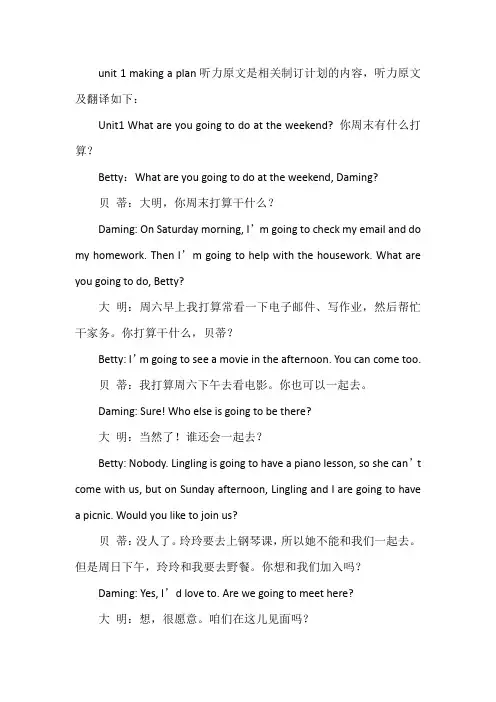
unit 1 making a plan听力原文是相关制订计划的内容,听力原文及翻译如下:Unit1 What are you going to do at the weekend? 你周末有什么打算?Betty:What are you going to do at the weekend, Daming?贝蒂:大明,你周末打算干什么?Daming: On Saturday morning, I’m going to check my email and do my homework. Then I’m going to help with the housework. What are you going to do, Betty?大明:周六早上我打算常看一下电子邮件、写作业,然后帮忙干家务。
你打算干什么,贝蒂?Betty: I’m going to see a movie in the afternoon. You can come too.贝蒂:我打算周六下午去看电影。
你也可以一起去。
Daming: Sure! Who else is going to be there?大明:当然了!谁还会一起去?Betty: Nobody. Lingling is going to have a piano lesson, so she can’t come with us, but on Sunday afternoon, Lingling and I are going to have a picnic. Would you like to join us?贝蒂:没人了。
玲玲要去上钢琴课,所以她不能和我们一起去。
但是周日下午,玲玲和我要去野餐。
你想和我们加入吗?Daming: Yes, I’d love to. Are we going to meet here?大明:想,很愿意。
咱们在这儿见面吗?Betty: No, we aren’t. We’re going to meet in the park at one o’clock.贝蒂:不是。
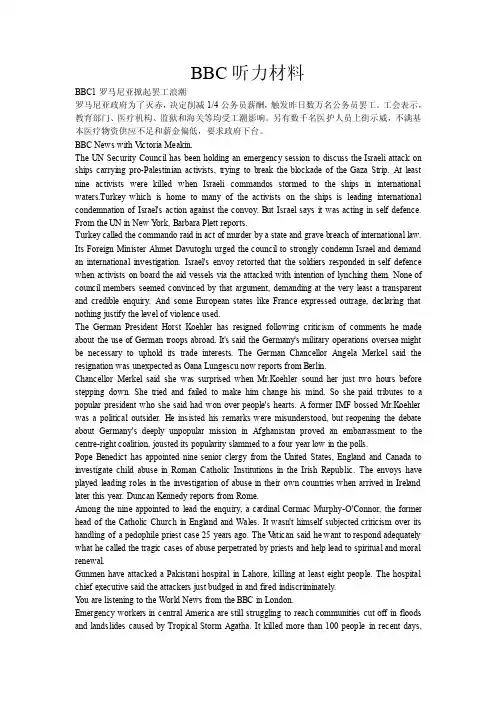
BBC听力材料BBC1罗马尼亚掀起罢工浪潮罗马尼亚政府为了灭赤,决定削减1/4公务员薪酬,触发昨日数万名公务员罢工。
工会表示,教育部门、医疗机构、监狱和海关等均受工潮影响。
另有数千名医护人员上街示威,不满基本医疗物资供应不足和薪金偏低,要求政府下台。
BBC News with V ictoria Meakin.The UN Security Council has been holding an emergency session to discuss the Israeli attack on ships carrying pro-Palestinian activists, trying to break the blockade of the Gaza Strip. At least nine activists were killed when Israeli commandos stormed to the ships in international waters.Turkey which is home to many of the activists on the ships is leading international condemnation of Israel's action against the convoy. But Israel says it was acting in self defence. From the UN in New Y ork, Barbara Plett reports.Turkey called the commando raid in act of murder by a state and grave breach of international law. Its Foreign Minister Ahmet Davutoglu urged the council to strongly condemn Israel and demand an international investigation. Israel's envoy retorted that the soldiers responded in self defence when activists on board the aid vessels via the attacked with intention of lynching them. None of council members seemed convinced by that argument, demanding at the very least a transparent and credible enquiry. And some European states like France expressed outrage, declaring that nothing justify the level of violence used.The German President Horst Koehler has resigned following criticism of comments he made about the use of German troops abroad. It's said the Germany's military operations oversea might be necessary to uphold its trade interests. The German Chancellor Angela Merkel said the resignation was unexpected as Oana Lungescu now reports from Berlin.Chancellor Merkel said she was surprised when Mr.Koehler sound her just two hours before stepping down. She tried and failed to make him change his mind. So she paid tributes to a popular president who she said had won over people's hearts. A former IMF bossed Mr.Koehler was a political outsider. He insisted his remarks were misunderstood, but reopening the debate about Germany's deeply unpopular mission in Afghanistan proved an embarrassment to the centre-right coalition, jousted its popularity slammed to a four year low in the polls.Pope Benedict has appointed nine senior clergy from the United States, England and Canada to investigate child abuse in Roman Catholic Institutions in the Irish Republic. The envoys have played leading roles in the investigation of abuse in their own countries when arrived in Ireland later this year. Duncan Kennedy reports from Rome.Among the nine appointed to lead the enquiry, a cardinal Cormac Murphy-O'Connor, the former head of the Catholic Church in England and Wales. It wasn't himself subjected criticism over its handling of a pedophile priest case 25 years ago. The V atican said he want to respond adequately what he called the tragic cases of abuse perpetrated by priests and help lead to spiritual and moral renewal.Gunmen have attacked a Pakistani hospital in Lahore, killing at least eight people. The hospital chief executive said the attackers just budged in and fired indiscriminately.Y ou are listening to the World News from the BBC in London.Emergency workers in central America are still struggling to reach communities cut off in floods and landslides caused by Tropical Storm Agatha. It killed more than 100 people in recent days,most of them in Guatemala. Rescue teams are digging through mud and debris in search of dozens of people still missing after the storm which destroyed several neighbourhoods near Guatemala city.Greece is imposing a blanket ban on smoking on indoors public places because a previous partial ban did not work. The Greek Government used World No Tobacco Day to make the announcement. Here is Malcolm Brabant in Athens.The new law will come into effect at the start of September. It means that bars and restaurants which had declared themselves as smoking establishments to fear of losing customer. We are now be forced to be tobacco of free. The ban is going to happen in intriguing impact on Greece's current economic crisis. 40% of all Greeks smoke and therefore make a sizable contribution to the national treasury. As part of its austerity measures, the government has imposed tax increases on cigarettes. The ban could reduce sales and therefore tax revenues considerably.Tens of thousands of public sector workers in Romania have gone on strike to protest against government austerity measures. From Tuesday, the centre-right government led by the Prime Minister Emil Boc plans to cut public sector salaries by a quarter in pensions by 15%. The measures are closely tie to a 25-billion-dollar aid package agreed last year with the International Monetary Fund with the aim of reducing Romania's ballooning budget deficit.The French-born American sculptor Louise Bourgeois has died in New Y ork at the age of 98. Placed in New Y ork since 1938, Bourgeois gained fame only late in her long career in keep working right up to end for life. In recent decades, Louise Bourgeois's abstract explorations of things such birds, sexuality and death made her one of the world's most influential contemporary artists.BBC2英国保诚保险收购美国友邦保险计划失败英国保诚集团(Prudential PLC)收购美国国际集团(American International Group Inc.,简称AIG)旗下亚洲人寿保险业务美国友邦保险公司(AIA)的交易计划失败。


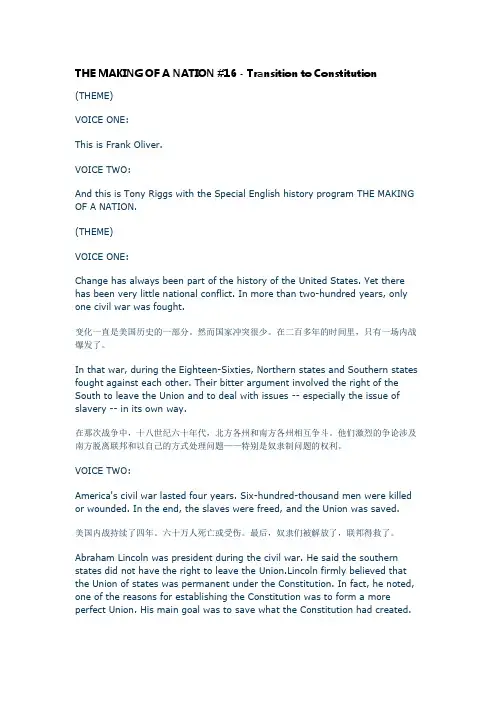
THE MAKING OF A NATION #16 - Transition to Constitution (THEME)VOICE ONE:This is Frank Oliver.VOICE TWO:And this is Tony Riggs with the Special English history program THE MAKING OF A NATION.(THEME)VOICE ONE:Change has always been part of the history of the United States. Yet there has been very little national conflict. In more than two-hundred years, only one civil war was fought.变化一直是美国历史的一部分。
然而国家冲突很少。
在二百多年的时间里,只有一场内战爆发了。
In that war, during the Eighteen-Sixties, Northern states and Southern states fought against each other. Their bitter argument involved the right of the South to leave the Union and to deal with issues -- especially the issue of slavery -- in its own way.在那次战争中,十八世纪六十年代,北方各州和南方各州相互争斗。
他们激烈的争论涉及南方脱离联邦和以自己的方式处理问题——特别是奴隶制问题的权利。
VOICE TWO:America's civil war lasted four years. Six-hundred-thousand men were killed or wounded. In the end, the slaves were freed, and the Union was saved.美国内战持续了四年。
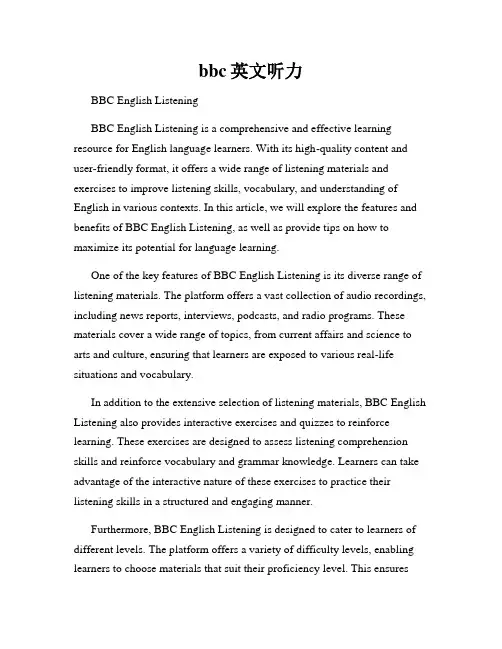
bbc英文听力BBC English ListeningBBC English Listening is a comprehensive and effective learning resource for English language learners. With its high-quality content and user-friendly format, it offers a wide range of listening materials and exercises to improve listening skills, vocabulary, and understanding of English in various contexts. In this article, we will explore the features and benefits of BBC English Listening, as well as provide tips on how to maximize its potential for language learning.One of the key features of BBC English Listening is its diverse range of listening materials. The platform offers a vast collection of audio recordings, including news reports, interviews, podcasts, and radio programs. These materials cover a wide range of topics, from current affairs and science to arts and culture, ensuring that learners are exposed to various real-life situations and vocabulary.In addition to the extensive selection of listening materials, BBC English Listening also provides interactive exercises and quizzes to reinforce learning. These exercises are designed to assess listening comprehension skills and reinforce vocabulary and grammar knowledge. Learners can take advantage of the interactive nature of these exercises to practice their listening skills in a structured and engaging manner.Furthermore, BBC English Listening is designed to cater to learners of different levels. The platform offers a variety of difficulty levels, enabling learners to choose materials that suit their proficiency level. This ensuresthat learners can gradually challenge themselves and progress at their own pace. Beginners can start with more basic topics and gradually move on to more advanced content as they gain confidence and proficiency in listening comprehension.BBC English Listening also incorporates a range of supplementary features to enhance the learning experience. It includes transcripts for many of the audio recordings, allowing learners to read along while listening. This helps to reinforce comprehension and improve pronunciation. The platform also provides vocabulary lists and explanations of difficult words and phrases, enabling learners to expand their vocabulary and deepen their understanding of the language.To make the most of BBC English Listening, here are some tips for effective language learning:1. Set aside dedicated time for listening practice. Consistency is key, so aim to listen to English content regularly.2. Start with materials that match your current level of proficiency. This will ensure that the content is challenging enough to help you progress, but not too difficult to discourage you.3. Practice active listening by making notes, summarizing key points, and reflecting on what you have learned from each listening exercise.4. Take advantage of the supplementary features provided by BBC English Listening, such as transcripts and vocabulary lists. Utilize them to enhance your understanding and improve your language skills.5. Gradually increase the difficulty level of the listening materials to challenge yourself and expand your language proficiency.In conclusion, BBC English Listening is a valuable resource for English language learners seeking to improve their listening skills and expand their vocabulary. With its wide range of listening materials, interactive exercises, and user-friendly features, it offers an effective and enjoyable platform for language learning. By incorporating regular listening practice into your language learning routine and making the most of the supplementary features, you can make significant progress in your English proficiency. So why wait? Start exploring BBC English Listening today and take your listening skills to the next level!。
THE MAKING OF A NATION #10 - The French and Indian War (THEME)VOICE ONE:This is Rich Kleinfeldt.VOICE TWO:And this is Sarah Long with the MAKING OF A NATION, A VOA Special English program about the history of the United States.(THEME)Today, we tell about the conflicts among the nations in Europe during the eighteenth century and how they affected North America.VOICE ONE:During the Eighteenth Century, Spain, France and Britain controlled land in North America. Spain controlled Florida. France was powerful in the northern and central areas. Britain controlled the east. All three nations knew they could not exist together peacefully in North America. The situation could only be settled by war.十八世纪,西班牙、法国和英国控制了北美洲的土地。
西班牙控制的佛罗里达州。
法国在北部和中部地区势力强大。
英国控制东部。
这三个国家都知道他们不能在北美洲和平共处。
局势只有通过战争才能解决。
The powerful European nations already were fighting each other for land and money all over the world. These small wars continued for more than one-hundred years. They were called King William's War, Queen Anne's War, King George's War and the French and Indian War.强大的欧洲国家已经在世界各地争夺土地和金钱。
初一英语听力原文及参考答案第一篇:初一英语听力原文及参考答案初一英语听力原文及参考答案2015.1听力原文:I.听小对话或小语段,选择正确的图片,将其序号填写在相应的横线上。
1.M: How do you spend your day, Helen? W: Well, on weekdays I get up around ten.Then I read the paper for an hour and have lunch at about noon.M: Really? What time do you go to work? H: I start work at three.2.You can use your computer to do lots of things.Many people buy books, clothes and many other things on the Internet.And shopping by computer is interesting to more people every day.People can shop for anything, anytime, anywhere in the world.3.M: Tell me about your brother and sister, Sue.W: Well, my sister is a manager.She is working in Washington.D.C., right now.M: Wow!And what does your brother do?W: He’s a painter.He draws pictures.He’s working in London now.M: What an interesting family!4.M: Hi, my name is Michael Parker.W: I’m Jennifer Yang.M: It’s nice to meet you, JenniferW: Nice to meet you, too.M: I’m sorry.What’s your last name again?W: It’s Yang.II.听录音,选出与你听到的句子意思相符的答语。
bbc英语听力100篇2023BBC English Listening 100 ArticlesIn today's fast-paced world, improving our English listening skills is essential for communication and understanding. To help learners of English, the BBC has compiled a series of 100 articles focused on English listening comprehension. These articles cover a wide range of topics, including news, culture, history, science, and more. Each article is accompanied by a listening exercise to test your understanding and improve your skills.The BBC English Listening 100 series is designed for learners of all levels, from beginners to advanced. The articles are specifically tailored to help you improve your vocabulary, grammar, and pronunciation while expanding your knowledge of the English language. Whether you are studying for an exam, preparing for a job interview, or simply want to improve your English skills, this series is a valuable resource.One of the key benefits of the BBC English Listening 100 series is the variety of accents and dialects featured in the listening exercises. This helps learners become familiar with different voices and accents, making it easier to understand English speakers from around the world. Additionally, the articlesare updated regularly to reflect current events and trends, ensuring that learners have access to relevant and up-to-date content.Overall, the BBC English Listening 100 series is a comprehensive and effective resource for improving English listening skills. By dedicating time to regularly practice listening to these articles, learners can enhance their comprehension, fluency, and confidence in using English in real-life situations. Whether you are a beginner or an advanced learner, this series offers valuable insights and opportunities to develop your English listening abilities.。
★⽆忧考英语听⼒频道为⼤家整理的bbc新闻英语听⼒材料,供⼤家参考。
更多阅读请查看本站频道。
Cuba has re-established direct telephone links with the United States for the first time in 15 years. It is the first agreement signed between Cuban and American companies since the announcement last December that both states will renew diplomatic ties after more than 50 years of hostility. Will Grant reports from Havana."A key part of the decision by the Obama administration to restore diplomatic ties with Cuba was to help boost telecommunications on the island. In the long term it is hopped in Washington that would mean greater internet access. But for now it has at least brought a direct telephone connection between the two countries. Previously calls were rated by a third countries driving out of the cost of a call to the US from Cuba and making it prohibitively expensive for ordinary Cubans." Key Phrases/Words1. re-establish v. 重建,重新建⽴,恢复2. hostility n. 敌意,敌对状态3. prohibitively expensive 价格⾼昂(使⼈却步)。
bbc 6分钟听力英文回答:The passage begins by introducing the topic of climate change and its potential impact on global food security. It states that climate change is a major threat to global food security, and that it is already having a negative impact on crop yields and livestock production.The passage then discusses the specific ways in which climate change is affecting food security. It explains that rising temperatures are causing crops to fail, and that extreme weather events, such as droughts and floods, are destroying farmlands and disrupting food distribution.The passage also discusses the impact of climate change on food prices. It explains that climate change is causing food prices to rise, and that this is making it difficult for people to afford to buy food.The passage concludes by calling for action to address the problem of climate change and its impact on food security. It states that governments, businesses, and individuals all need to take action to reduce greenhousegas emissions and adapt to the impacts of climate change.中文回答:气候变化已经对全球粮食安全构成了严重威胁,气候变化不仅对作物产量产生了负面影响,同样也对畜牧业的生产造成了负面影响。
BOB DOUGHTY: Welcome to the MAKING OF A NATION -- American history in VOA Special English.This week in our series, we talk about the presidential election of eighteen twelve.The first ten years of the twentieth century in America were shaped by the strong leadership of President Theodore Roosevelt. And in the second decade, he returned to national politics to bring, once more, dramatic changes to the United States.Theodore Roosevelt was a distant cousin of Franklin Roosevelt, a Democrat who became president in nineteen thirty-three.In nineteen twelve, Teddy Roosevelt organized a new political party: the Progressives. Roosevelt created this new party after he failed to win the Republican presidential nomination.The Republican convention of nineteen twelve had been controlled by conservative supporters of President William Howard Taft. And, as we hear now from Leo Scully and Maurice Joyce, the party nominated Taft for four more years in the White House.LEO SCULLY: As a result, Roosevelt broke with the Republicans. And he and his supporters held their own convention. They formed the Progressive party and approved a platform that promised reforms. These reforms were proposed to make the government serve the people and carry out more fully their desire for social progress.The Democratic Party also nominated a candidate who supported progressive ideas. The Democrats chose Governor Woodrow Wilson of New Jersey, a former president of Princeton University. So, for the first time in many years, there were three major candidates for president. Wilson clearly had the best chance to win. He had the support of almost all the Democrats. The Republicans, however, were split. Some supported Taft. The others were for Roosevelt.MAURICE JOYCE: Roosevelt refused to accept the idea of defeat. He campaigned hard, visiting many cities and towns, making speech after speech. Wilson also campaigned hard. He seemed to enjoy it as much as Roosevelt.Taft did not like it at all. He refused to do much campaigning. He spent most of the time at his summer home.It was a quiet election campaign...until the middle of October. Then, only three weeks before election day, Roosevelt was shot.LEO SCULLY: It happened in Milwaukee. Roosevelt had just left his hotel and climbed into the automobile that would carry him to the hall where he planned to make a speech. As he stood in the open car, an extremist named John Schrank ran up to him, pulled a gun from his coat, and fired a bullet into Roosevelt's chest.The bullet knocked him down. Roosevelt said it felt as if he had been kicked by a mule. He jumped up and put his hand to the wound. The bullet had passed through the inside pocket of his coat. It struck a steel case that held his glasses, and went through the folded fifty pages of his written speech. These slowed the bullet, and it went only a few centimeters into his chest.MAURICE JOYCE: Roosevelt did not know if he was seriously wounded. He put his hand to his mouth and coughed. No blood came. And he knew the shot had not damaged his lungs. Roosevelt ordered the crowd around to stop beating Schrank. "Bring him tome," he said. He looked down at the man. "You poor creature," said Roosevelt. Then he turned away.Doctors arrived. They said Roosevelt must go at once to the hospital. But Roosevelt refused. He said he would go to the hall. "I will make this speech," he said, "or die. It will be one or the other." On his way to the hall, he told a friend: "It takes more than that to kill a Roosevelt. I do not care a rap about being shot. Not a rap." LEO SCULLY: At the hall, he stood before the big crowd. His face was white. But he stood straight, without help. Someone announced that Roosevelt had been wounded, but still planned to speak.Roosevelt's voice was very low, almost a whisper. "I am going to ask you to be very quiet. And please excuse me from making a long speech. I will do the best I can. But there is a bullet in me." He paused and then continued. "It is nothing. I am not hurt badly. I have something to say. And I will say it as long as there is life in my body."MAURICE JOYCE: Roosevelt's speech was not important. He said nothing that he had not already said many times before. What wasimportant, however, was his cool courage. Men did not see his act as foolish or overly-dramatic. They saw it as the brave act of a strong man. To the public, he was a hero.Roosevelt spoke for almost an hour. Finally, very weak, he let himself be helped from the hall. He was rushed to a hospital where doctors could examine the wound.LEO SCULLY: The doctors found that the bullet had broken a rib, but caused no serious damage. They decided to leave the bullet where it was. The next day, Roosevelt made a statement from his hospital bed. "Tell the people not to worry about me. For if I go down, another will take my place."President Taft and Woodrow Wilson sent messages of regret to Roosevelt. They announced that they would not campaign until Roosevelt was able to do so.MAURICE JOYCE: Roosevelt's condition improved quickly. After two weeks of rest, he was ready to continue his campaign for the presidency. He made a speech to a big crowd at Madison Square Garden in New York City. Everyone was surprised to see how strong and healthy he seemed.Wilson ended his campaign in New York City the next day. He told a cheering crowd of Democrats: "What the Democratic Party proposes to do is to go into power and do the things that the Republican Party has been talking about for sixteen years."LEO SCULLY: On November fifth, the people voted. The winner was Woodrow Wilson. He received more than six million votes. Roosevelt was second with four million. Taft received only about three and a half million. Wilson's victory was even greater in the electoral vote. He got four hundred thirty-five. Roosevelt got only eighty-eight. And Taft received only the eight electoral votes of Utah and Vermont.The Democrats won not only the White House, but also control of Congress. And a number of Democratic governors were elected in states formerly controlled by Republicans.MAURICE JOYCE: The nineteen twelve campaign ended public life for Theodore Roosevelt. Soon after the election, a friend visited Roosevelt and talked of possible victory in nineteen sixteen."I thought you were a better politician," Roosevelt said. "The fight is over. We are beaten. There is only one thing to do. That is to goback to the Republican Party. You cannot hold a party like the Progressive Party together. There are no loaves and fishes...no financial support."LEO SCULLY: War was soon to break out in Europe. The United States would enter the struggle in nineteen seventeen.As always, Roosevelt was ready to join in a fight. He asked for permission to organize an American force and lead it into battle in France. President Wilson, however, turned down the request. Roosevelt was sure that it was a political decision. He never forgave Wilson for keeping him out of the war.Although Roosevelt himself could not fight, four of his sons went into battle. One -- his youngest son Quentin -- did not return. When he received news of his son's death, Roosevelt wrote these words to honor him:MAURICE JOYCE: "Only those are fit to live who do not fear to die. And none are fit to die who have shrunk from the joy of life. Both life and death are parts of the same great adventure. All of us who give service and stand ready for sacrifice are torch bearers. We run with the torches until we fall, satisfied if we can then pass them to thehands of other runners."The torches whose flame is brightest are carried by the brave men on the battlefield and by the brave women whose husbands, lovers, sons, and brothers struggle there. These are the torch bearers. These are they who have dared the great adventure."LEO SCULLY: Roosevelt's own great adventure was itself coming to an end.He suffered from painful attacks of inflammatory rheumatism and from a serious ear infection. He had difficulty in hearing and could not walk. But the old man was still cheerful. He spent his sixtieth birthday in the hospital. And to his family and friends, he said: "I am ahead of the game. Nobody ever packed more kinds of fun and interest into sixty years."Death came to Roosevelt as he slept on the night of January sixth, nineteen nineteen. Said Vice President Thomas Marshall: "Death had to take him sleeping. For if Roosevelt had been awake, there would have been a fight."BOB DOUGHTY: Our program was written by Frank Beardsley. The narrators were Leo Scully and Maurice Joyce.You can find our series online with transcripts, MP3s, podcasts and images at . You can also follow us on Facebook and Twitter at VOA Learning English. Join us again next week for THE MAKING OF A NATION -- an American history series in VOA Special English.。